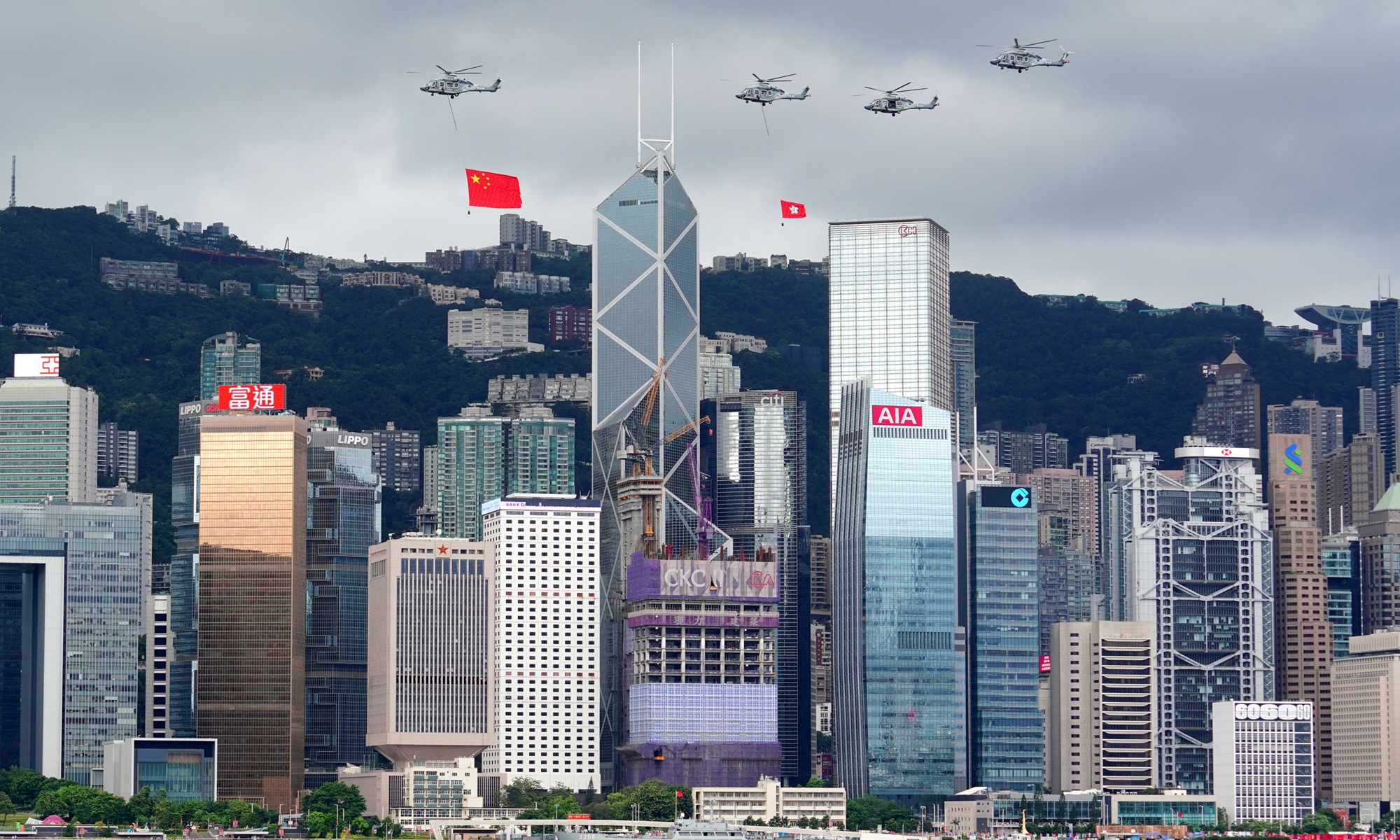
Helicopters displaying the Chinese national flag and the Hong Kong regional flag fly over Victoria Harbour during celebrations of the 25th anniversary of Hong Kong's return to the motherland on July 1, 2022. Photo: cnsphoto
A public opinion poll of Hong Kong Special Administrative Region (SAR) residents shows that 71.9 percent of respondents believe the rule of law has been restored after the implementation of the national security law for Hong Kong, an official from China's Hong Kong and Macao Affairs Office of the State Council (HKMAO) said on Tuesday. The implementation of the national security law has boosted the residents' confidence in the practice of "one country, two systems" in Hong Kong, according to the HKMAO.
"Maintaining national security is a common practice around the world. The political power must be firmly in the hands of patriots, which is a common political law around the world," Huang Liuquan, deputy head of the HKMAO, said at a news conference in Beijing on Tuesday.
"All countries around the world have their own laws to maintain national security, and in China, the national security law for Hong Kong SAR is the same as those of the other countries in terms of the purpose of legislation and the content of legislation."
Huang stressed that the facts also prove the usefulness of the national security law. According to a public opinion poll, 71.9 percent of respondents believe that the implementation of the national security law for Hong Kong has boosted Hong Kong residents' confidence in the practice of "one country, two systems."
In response to the once chaotic situation in Hong Kong, the central government promoted the establishment of a sound legal system and enforcement mechanism for safeguarding national security in the SAR, enacted the national security law, and improved the electoral system, he said.
The central government also supported the Macao SAR in initiating amendments to its national security law.
"These provide solid institutional safeguards to achieve long-term stability for Hong Kong and Macao and promote the practice of 'one country, two systems.'"
"As the mainland's connection with Hong Kong and Macao grows and exchanges and cooperation deepen, the national consciousness and patriotic spirit of compatriots in Hong Kong and Macao are also growing," he said, noting that especially after experiencing stormy challenges, compatriots in Hong Kong and Macao have become more deeply aware that the SARs have always been linked to the motherland through thick and thin.
Economically, Hong Kong and Macao have also maintained a vigorous development in the past 10 years.
Hong Kong's status as an international financial, shipping and trade hub is firmly established, and the innovative technology industries are emerging rapidly.
Hong Kong has been ranked as the world's freest economy for more than 20 consecutive years and has long ranked among the top in the world competitiveness rankings, according to the HKMAO.
At present, the construction of the Guangdong-Hong Kong-Macao Greater Bay Area (GBA) has achieved important milestones. With the completion and opening of the Guangzhou-Shenzhen-Hong Kong Express Rail Link, the Hong Kong-Zhuhai-Macao Bridge and a number of ports, the deepening of the convergence of rules and docking of mechanisms between the mainland, Hong Kong and Macao continued to deepen.
In the past two years, Hong Kong and Macao, like the rest of the world, have been severely hit by the COVID-19 pandemic. The governments of the two SARs, under the support of the central government, took active and effective measures to alleviate people's hardship, boost economic recovery, and promote various constructions, Huang said.
In response to questions about the epidemic prevention and control measures taken by Hong Kong affecting its links with the world, Huang said that the government has been adjusting and optimizing Hong Kong's epidemic prevention and control measures in response to the situation, and these measures should not be overly interpreted.
He said the epidemic has and is profoundly affecting and changing the way the world interacts with each other.
"The new SAR government has repeatedly stressed that there is no contradiction between connecting to the world and border control with the mainland," Huang said on Tuesday. "The SAR government is also coordinating the prevention and control of the epidemic as well as economic and social development in Hong Kong, according to the changes of COVID-19 pandemic situation in the world and in Hong Kong."
In response to a question raised during the conference about the emergence of a "migration wave" in Hong Kong, Huang said that based on more complete data, it is not sufficient to conclude that Hong Kong's population has declined because of a "migration wave."
"Saying there is a 'migration wave' in Hong Kong is not appropriate," Huang said. "Hong Kong, as an international city, has always had a high mobility of population."
"The government will continue to attract talents from home and abroad to settle in Hong Kong and promote the mobility of talents within the GBA," he said. "Hong Kong's location advantage of being backed by the motherland and connected to the world will definitely attract more talents."
Global Times




